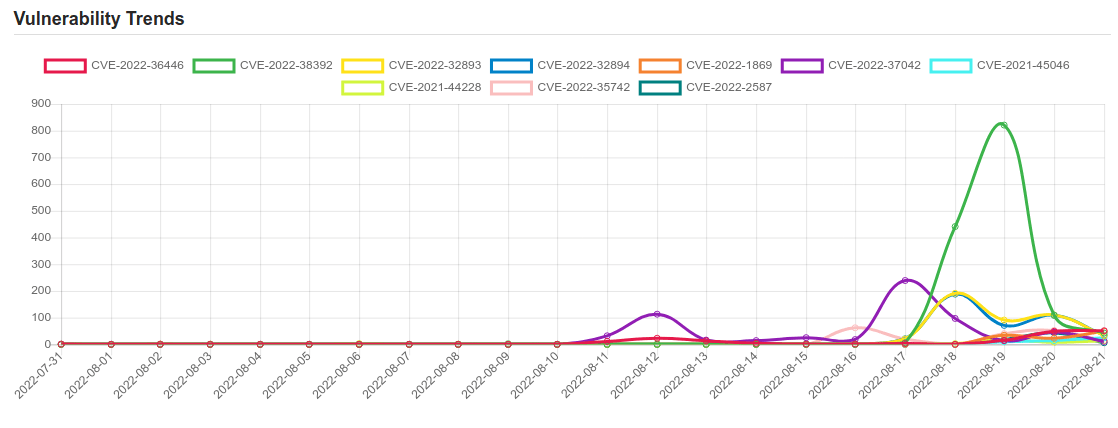Daily Vulnerability Trends: Mon Aug 22 2022

| CVE NAME | CVE Description |
| CVE-2022-2856 | No description provided |
| CVE-2022-22536 | SAP NetWeaver Application Server ABAP, SAP NetWeaver Application Server Java, ABAP Platform, SAP Content Server 7.53 and SAP Web Dispatcher are vulnerable for request smuggling and request concatenation. An unauthenticated attacker can prepend a victim’s request with arbitrary data. This way, the attacker can execute functions impersonating the victim or poison intermediary Web caches. A successful attack could result in complete compromise of Confidentiality, Integrity and Availability of the system. |
| CVE-2022-27255 | In Realtek eCos RSDK 1.5.7p1 and MSDK 4.9.4p1, the SIP ALG function that rewrites SDP data has a stack-based buffer overflow. This allows an attacker to remotely execute code without authentication via a crafted SIP packet that contains malicious SDP data. |
| CVE-2022-26923 | Active Directory Domain Services Elevation of Privilege Vulnerability. |
| CVE-2017-15944 | Palo Alto Networks PAN-OS before 6.1.19, 7.0.x before 7.0.19, 7.1.x before 7.1.14, and 8.0.x before 8.0.6 allows remote attackers to execute arbitrary code via vectors involving the management interface. |
| CVE-2021-45105 | Apache Log4j2 versions 2.0-alpha1 through 2.16.0 (excluding 2.12.3 and 2.3.1) did not protect from uncontrolled recursion from self-referential lookups. This allows an attacker with control over Thread Context Map data to cause a denial of service when a crafted string is interpreted. This issue was fixed in Log4j 2.17.0, 2.12.3, and 2.3.1. |
| CVE-2022-21971 | Windows Runtime Remote Code Execution Vulnerability. |
| CVE-2021-1789 | A type confusion issue was addressed with improved state handling. This issue is fixed in macOS Big Sur 11.2, Security Update 2021-001 Catalina, Security Update 2021-001 Mojave, tvOS 14.4, watchOS 7.3, iOS 14.4 and iPadOS 14.4, Safari 14.0.3. Processing maliciously crafted web content may lead to arbitrary code execution. |
| CVE-2022-27925 | Zimbra Collaboration (aka ZCS) 8.8.15 and 9.0 has mboximport functionality that receives a ZIP archive and extracts files from it. An authenticated user with administrator rights has the ability to upload arbitrary files to the system, leading to directory traversal. |
| CVE-2022-36446 | software/apt-lib.pl in Webmin before 1.997 lacks HTML escaping for a UI command. |
| CVE-2022-38392 | A certain 5400 RPM OEM hard drive, as shipped with laptop PCs in approximately 2005, allows physically proximate attackers to cause a denial of service (device malfunction and system crash) via a resonant-frequency attack with the audio signal from the Rhythm Nation music video. |
| CVE-2022-32893 | No description provided |
| CVE-2022-32894 | No description provided |
| CVE-2022-1869 | Type Confusion in V8 in Google Chrome prior to 102.0.5005.61 allowed a remote attacker to potentially exploit heap corruption via a crafted HTML page. |
| CVE-2022-37042 | Zimbra Collaboration Suite (ZCS) 8.8.15 and 9.0 has mboximport functionality that receives a ZIP archive and extracts files from it. By bypassing authentication (i.e., not having an authtoken), an attacker can upload arbitrary files to the system, leading to directory traversal and remote code execution. NOTE: this issue exists because of an incomplete fix for CVE-2022-27925. |
| CVE-2021-45046 | It was found that the fix to address CVE-2021-44228 in Apache Log4j 2.15.0 was incomplete in certain non-default configurations. This could allows attackers with control over Thread Context Map (MDC) input data when the logging configuration uses a non-default Pattern Layout with either a Context Lookup (for example, $${ctx:loginId}) or a Thread Context Map pattern (%X, %mdc, or %MDC) to craft malicious input data using a JNDI Lookup pattern resulting in an information leak and remote code execution in some environments and local code execution in all environments. Log4j 2.16.0 (Java 8) and 2.12.2 (Java 7) fix this issue by removing support for message lookup patterns and disabling JNDI functionality by default. |
| CVE-2021-44228 | Apache Log4j2 2.0-beta9 through 2.15.0 (excluding security releases 2.12.2, 2.12.3, and 2.3.1) JNDI features used in configuration, log messages, and parameters do not protect against attacker controlled LDAP and other JNDI related endpoints. An attacker who can control log messages or log message parameters can execute arbitrary code loaded from LDAP servers when message lookup substitution is enabled. From log4j 2.15.0, this behavior has been disabled by default. From version 2.16.0 (along with 2.12.2, 2.12.3, and 2.3.1), this functionality has been completely removed. Note that this vulnerability is specific to log4j-core and does not affect log4net, log4cxx, or other Apache Logging Services projects. |
| CVE-2022-35742 | No description provided |
| CVE-2022-2587 | Out of bounds write in Chrome OS Audio Server in Google Chrome on Chrome OS prior to 102.0.5005.125 allowed a remote attacker to potentially exploit heap corruption via crafted audio metadata. |
| CVE-2022-1802 | No description provided |
A considerable amount of time and effort goes into maintaining this website, creating backend automation and creating new features and content for you to make actionable intelligence decisions. Everyone that supports the site helps enable new functionality.
If you like the site, please support us on Patreon using the button below

To keep up to date follow us on the below channels.




![Cobalt Strike Beacon Detected - 179[.]43[.]186[.]234:80 6 Cobalt-Strike](https://www.redpacketsecurity.com/wp-content/uploads/2021/11/Cobalt-Strike-300x201.jpg)
![[PLAY] - Ransomware Victim: All Book Covers 7 image](https://www.redpacketsecurity.com/wp-content/uploads/2024/09/image-300x300.png)